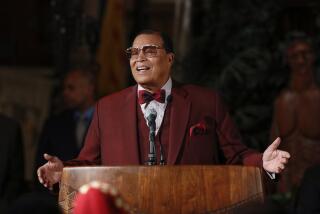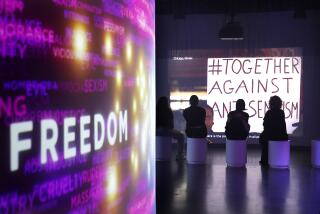Farrakhan and Anti-Semitism
- Share via
Roger Wilkins has it wrong (Opinion, Feb. 6). The paradox is not Louis Farrakhan. The paradox is mainstream black leadership. They did not embrace Farrakhan because they liked him or agreed with his message. They embraced him because large segments of black America did. If Farrakhan seized the leadership high ground, it was because mainstream black leaders fumbled the ball.
During the 1970s and 1980s, the NAACP, Urban League and the Congressional Black Caucus crafted a myopic agenda that appealed to upwardly mobile black business people and professionals, while excluding the black poor. Affirmative action, economic parity, professional advancement and busing replaced poverty, unemployment, quality education and political empowerment.
The schism between the black poor and the black middle class grew deeper. It was especially damaging to young blacks. Stripped of credible leadership role models, and with dwindling job and educational opportunities, many turned to gangs, guns and drugs. Farrakhan stepped into the breech. He talked tough to “whitey” and seemed to have practical answers for ghetto problems. The attacks by mainstream black leaders, the media and Jewish groups made him even more appealing to many blacks who saw him as both rebel and martyr.
Wilkins deludes himself when he asserts that mainstream black leaders are back in control. They aren’t. Farrakhan will again turn the “isolation” and ostracism by mainstream black leaders to his advantage and likely gain even more converts.
EARL OFARI HUTCHINSON
Los Angeles
The Times has done record-breaking moral gymnastics to avoid unambiguously condemning Farrakhan (editorial, Feb. 4). Your solicitude for this bigot is difficult to comprehend. Your describe him as “an unrepentant hatemonger at times.” What, then, is a full-time hatemonger like? It is as if the hate can be parsed from the hater.
You are waiting for him to unambiguously separate himself from his national spokesman Khallid Abdul Muhammad’s remarks attacking Jews, gays, Catholics and whites. Farrakhan didn’t and he won’t.
Farrakhan’s and the Nation of Islam’s ideology is suffused with hate and division. But you don’t have to take the Anti-Defamation League’s word for it--Henry Louis Gates, chairman of the Black Studies Department at Harvard University, has written: “The strategy of these apostles of hate (the Nation of Islam), I believe, is best understood as ethnic isolationism--they know that the more isolated Black America becomes, the greater their power. What’s the most efficient way to begin to sever Black America from its allies? Bash the Jews, these demagogues apparently calculate, and you’re halfway there.”
What The Times so glaringly fails to understand is that racial isolationism, anti-Semitism and anti-white racism are not incidental to the Nation of Islam’s agenda, but at the very heart of it.
DAVID A. LEHRER
Regional Director, ADL
Los Angeles
I am very disheartened by all of the comments both pro and con regarding the recent events involving Farrakhan. Decades ago Malcolm X said, “What needs to happen is for the white man and the black man to sit down at a table together. The white man should tell the black man his feelings with a concern for the black man’s feelings, and the black man should tell the white man his feelings with a concern for the white man’s feelings. Then all of this stuff that’s under the table can be placed on top of it, and we can all start dealing with it.” Malcolm X was portrayed as a militant. In this age of reason, we could use more militants.
MATT GIORGI
Brea
Yes, black racism is as intrinsically sinful and evil as white racism. But the issue is power, of which black racism has very little attached. White racism toward African Americans is backed with the necessary economic and social power which results in the vicious discrimination that plagues the United States.
Muhammad’s remarks were repulsive and Farrakhan’s rebuke seemed calculated and halfhearted. But each day in the corridors and communities of white power I hear the whispers and more subtly see the tools of white racism perpetuate a far more effective and hence destructive discriminatory force.
I will save my outrage until the playing field is equal between African Americans and whites and the power equation balanced. We should all work to that goal of justice rather than perpetuate the status quo while wasting time wondering about the sincerity of Louis Farrakhan’s rebuke.
THE REV. TIMOTHY B. SAFFORD
Los Angeles
As a member of the black community, I appreciate the fact that the media have made it clear that the racist views espoused by Farrakhan and his representatives of the Nation of Islam do not represent attitudes of the entire black community. Not all of us are so easily beguiled. CHRISTINE McGILL
Huntington Beach
More to Read
Sign up for Essential California
The most important California stories and recommendations in your inbox every morning.
You may occasionally receive promotional content from the Los Angeles Times.













